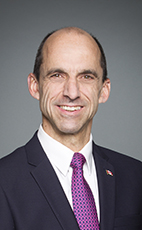Mr. Speaker, first, I would like to thank the hon. members who spoke to the bill: the hon. member for Ahuntsic, the hon. member for Welland, who asked a pertinent question concerning royal assent—and I think that the speech by the hon. member for Leeds—Grenville will comfort him—and the hon. member for Victoria, who is an ardent defender of women's rights.
At the outset, I want to say that this private member's bill has not been introduced by a single member, but with the support of all the other members of his caucus. I want to underscore the personal contribution and the selflessness shown by our party's whip, the member for Prince George—Peace River, without whom the bill could not make its way through the administrative maze. Members are aware that bills are adopted through a relatively complex process. I benefit from the hon. member's support and logistical help and I thank him for that. This is a cause that is important to him and has been for a long time.
On the government side, I want to acknowledge the contribution of the Minister of Public Safety and the Minister of Human Resources and Social Development who provided me with a great deal of support to ensure that this bill got off the ground. I think all parliamentarians agree with the bill's principles. The purpose of the bill is to protect women from violent ex-spouses. I am glad this is something that is supported by parliamentarians, regardless of the party they belong to or where they are from in this country. Now we have to find a way to make this bill effective and that is why I am working in close cooperation with the ministers I just mentioned.
According to Statistics Canada, there are still far too many women—653,000 women, but also 546,000 men—who encountered violence by their spouse or partner between 1999 and 2004. Some 9% of women even reported that they had been stalked by their spouse. This type of harassment involves repeated threatening or intimidating telephone calls. The spouse might follow or spy on the victim, physically or psychologically threaten the victim or, worst yet, try to kill the victim. Over 60% of stalking victims pursued by an ex-spouse were harassed for over one year.
We realize that this bill is not necessarily perfect and that it will not address all situations. However, if even a single woman in this country, and her children, is protected from her ex-spouse, we will have attained our objective. We cannot expect perfection before taking action. Too many women need our help.
Resources are available to women and I am proud of the assistance provided by Jonction pour Elle to the women in Lévis. The member for Welland spoke of one organization. Many agencies need tools to effectively help women. It is not right for a violent ex-spouse to get away with going to a police station to obtain all the information about the person we are trying to protect.
The House must pass this bill without delay. Naturally, the parliamentary committee will have the opportunity to make amendments and improve it. Time is money and too many women need this bill. I could continue by providing some examples.
It is not true that the bill will be costly. During the last debate, large amounts such as $400,000 were bandied about. That is not necessarily the case. We are looking at a much lower figure, perhaps in the order of tens of thousands of dollars in some cases.
There are also tragic examples. Right in Montreal, violent ex-husbands have gone so far as to enter the houses where these women have sought refuge and to attempt to take their lives.
Our government has been working with the provinces since January 2006 to improve the status of women. I believe that this bill, with the support of members of the House, will be another step that the Government of Canada and parliamentarians can take to ensure that we live in a better society. This is, unfortunately, one of the elements we need at this time to help those women most in need.

